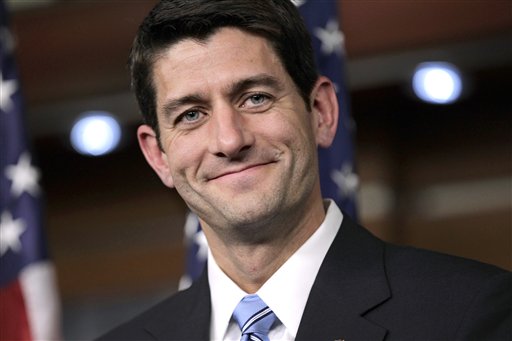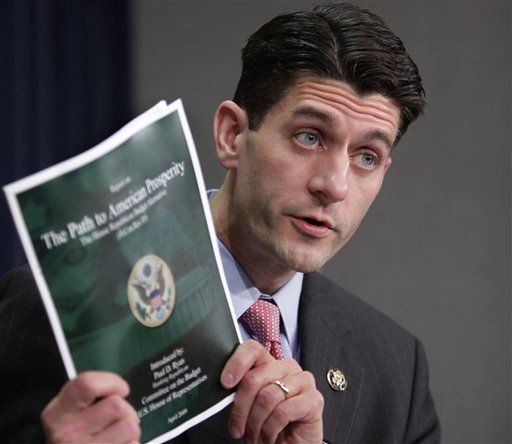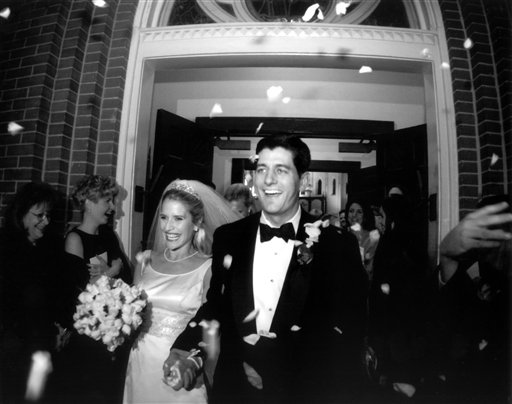Since his youth, Paul Ryan has shown a knack for eliciting mixed feelings.
Classmates at Joseph A. Craig High School in Janesville, Wis., bestowed on him the dubious title of “Biggest Brown-Noser.” They also elected him class president and anointed him prom king.
During his rapid political ascent, to become chief architect of love-it or hate-it Republican budget policy, many of his Democratic adversaries have coupled criticism of his ideology with praise for his cordiality, diligence and thoughtfulness.
“I’ve known Paul Ryan for a long time. He’s a serious guy,” said Wisconsin state Sen. Tim Cullen, a moderate Democrat who shares constituents with Ryan. “I think the American people need more serious people in Washington and fewer bomb-throwers.”
In the days since Mitt Romney selected Ryan for the vice presidential slot on the Republican ticket, the 42-year-old congressman’s biography has become instant folklore. Lifelong resident of a little city in the heartland. Embracing new responsibilities as a teenager after the sudden death of his father. Devoted husband and father, devout Roman Catholic, avid deer hunter/fisherman/fitness buff.
Scott Angus, longtime editor of the Janesville Gazette, said Ryan’s political views are divisive even in his home town. But Angus has been disabusing out-of-town reporters of the notion that they might uncover some skeletons in Ryan’s personal life.
“The whole image of an all-American boy from an all-American city – it’s all true,” Angus said. “He really is as genuine as you’re going to find.”
Yet Janesville, where Ryan still lives in the upscale neighborhood where he was born, is only part of his story.
Washington, D.C., lured him starting back in college, when he served as a lowly congressional intern, sorting mail and asking precocious policy questions.
The nation’s capital has never eased its hold on him since then. There were further congressional staff jobs, a stint with a conservative think tank and, since his first election in 1998, seven terms as a congressman representing southern Wisconsin’s 1st District.
Now, he’s embraced the chance to be near the pinnacle of inside-the-Beltway power.
In June, when he was rumored to be high on Romney’s list of possible running mates, he told The Associated Press he never intended to become a “permanent fixture” in Washington. But he also said he’d become “enthralled with public service” and the competitive rush of Capitol Hill policy battles.
“I really don’t have tremendous political ambition. I have policy ambition,” he said.
As House Budget Committee chairman, Ryan is the mastermind of divisive GOP budget plans that would curb the growth of Medicare, slash safety-net programs for the poor and extend all Bush-era tax cuts, including those for the rich. The aim, Ryan says, is to get the nation’s fiscal house in order before the deficit spins out of control.
Ryan is also one of the most successful fundraisers in Congress and a favorite of several big-spending political action committees. Within days of his selection by Romney, he made time for a private meeting in Las Vegas with casino mogul and GOP mega-donor Sheldon Adelson.
“Paul talks about being from Janesville, but he’s an absolute product of Capitol Hill,” said state Sen. Joe Erpenbach.
TRAUMATIC EVENT
Ryan’s story begins in Janesville. The son of a well-to-do attorney, Ryan is the youngest of four children. He was an altar boy and attended Catholic school before moving on to Craig for high school.
He faced tragedy head-on at 16 when, after arising one morning at home, he discovered his father dead of a heart attack.
His older brother, Tobin, said the event became a “catalyst” for Paul. “It could have been a period where he stuck his head under a pillow and didn’t want to come out,” he said. “Instead he developed and matured in ways you couldn’t imagine.”
With his older siblings no longer at home, and his mother commuting to out-of-town college courses, Ryan became a principal caregiver for his grandmother, who had Alzheimer’s disease.
“Paul also takes a job at McDonald’s, excels at school, becomes class president,” Tobin recalled. “He really took responsibility.”
Ryan himself has not spoken much in public about his father’s death. In a New Yorker interview, he said, “I was like, `What is the meaning?’ I just did lots of reading, lots of introspection.”
At high school, Ryan won the race for class president on a ticket together with his cousin, Adam Ryan, when both were juniors. When they graduated the following year, Adam was named in the yearbook as “Most Likely to Succeed,” while Paul was “Biggest Brown-Noser.”
Where that came from, Ryan’s cousin isn’t sure. But Adam, now president of Ryan Inc. Central, the Janesville construction company founded by his and Paul’s grandfathers, could see back in high school that his cousin might be headed for the fast track.
In their senior year, Paul asked to come along when Adam went to a regional meeting of the Model United Nations. The future congressman had never before been active in the group, which offers students a chance to play the roles of U.N. delegates.
After watching the proceedings for a while, Paul vanished from his cousin’s side and reappeared at the podium to address the entire group of perhaps 1,000 attendees, Adam said.
“He had basically figured out what was going on and had taken over the group. He was voted best delegate,” Adam said. “When he gets interested in something, he’s a very quick study.”
Through the years, that fast-learner trait would be noticed again and again and would serve him well.
As newcomer in Congress, he immersed himself in complex number-crunching and budgetary minutia. He’d brag about reading the entire federal budget – “Not many people do that. It’s fairly laborious,” he said – and also told the Weekly Standard last year that meetings with budget actuaries were “the highlight of my day.”
Those interests had surfaced in college, when Ryan pursued an economics/political science double major at Miami University in Ohio. He had no problems with a macroeconomics class loaded with analytics and math.
Ryan also read the works of free-market thinkers such as Milton Friedman and Ayn Rand, and fine-tuned his views in lengthy chats with a libertarian economics professor, Rich Hart.
“The core beliefs were already there,” Hart said. “I think he was just honing them with his studies, strengthening his belief in empowering individuals.”
Rand, the Russian-born writer who championed individualism and assailed big government, had particular sway.
“The reason I got involved in public service, by and large, if I had to credit one thinker, one person, it would be Ayn Rand,” Ryan said in a speech in 2005, though he later noted that he rejected some of Rand’s views, including her atheism.
Ryan lived in a dormitory his freshman year at Miami, then moved to the Delta Tau Delta fraternity house. But no “Animal House” stories follow.
“He was a pretty conservative guy,” said a former frat brother, Michael Loisel, while also noting that Ryan had a sense of humor. “He liked to engage in conversation.”
And the conversation, as usual with Ryan, was relatively substantive _ or as Loisel recalled, “more depth than the `Where did you go last night?’ and `How much did you drink?'”
It was in college, while studying economic theories and principles, when Ryan got his first chance to test them in the real world of the nation’s capital. He obtained an internship in the Washington office of Sen. Bob Kasten, a Wisconsin Republican.
Cesar Conda, now chief of staff for Sen. Marco Rubio of Florida, was at that point the staff director of a committee headed by Kasten and took note of the diligent newcomer.
“Delivering mail, he would always pop his head in and ask me questions about economics,” Conda said – questions that were “a cut above” those expected from an intern.
Conda recommended some not-so-light reading – George Gilder’s “Wealth and Poverty,” and Jude Wanniski’s “The Way the World Works.” Both had influenced the supply-side economic theories of the Reagan era. He said Ryan devoured them.
Conda also takes credit for introducing Romney to Ryan years later, during a Capitol Hill visit in 2007 when Romney was running for president.
“It was supposed to be a short courtesy meeting, but it turned out to be an hour, talking about tax reform, entitlements – a very wonkish discussion,” Conda recalled. “Afterward, Romney said, `I really like this guy. He’s very sharp.'”
Ryan, after graduating from college in 1992, returned to Washington for a paid stint with Kasten’s office. Connections with Conda and others soon led to a job with Empower America, a think tank featuring conservative luminaries such as Jack Kemp, the former congressman and vice presidential candidate, and Bill Bennett, the former drug czar and education secretary.
“I gave him a book list I’d been carrying around … Shakespeare, the founding documents, the Federalist Papers, a book of quotations,” Bennett said. “Everything I gave to him to read, he read.”
Ryan later was a speechwriter for Kemp, then legislative director for Sen. Sam Brownback of Kansas.
A turning point came in 1997 when Ryan, after getting a taste of how Washington works, returned to Janesville. He went to work for the family construction firm, but the change of address had other benefits.
Ryan knew that the 1st District congressional seat would be opening up because the incumbent Republican was running for the Senate. Ryan used his time at home to rebuild local ties and line up support. He figured that if he was to return to Washington, being a congressman would at least give him the chance to commute regularly back to Janesville.
At 28, Ryan had never run for any sort of public office, but he campaigned aggressively. One of his endorsements came from the Wisconsin State Journal, which called him “The Rich Kid With The Common Touch.”
“Ryan might sound like a policy wonk (and, in some ways, he is) but he’s also a likable candidate who appears at home in many different settings,” the paper said.
Ryan won the GOP primary over a musician with 80 percent of the vote, then trounced his Democratic opponent in the general election with 57 percent of the vote.
Jim Johnson, owner of four Janesville convenience stores and a lifelong friend of the Ryan clan, remembers a social gathering at which Ryan announced he’d run for Congress.
“We were all skeptical and asked a lot of questions _ and he was ready,” Johnson said. “That was the toughest race he’s had. Since then, he’s been able to focus on policy rather than getting re-elected.”
COMMITTED TO THE BUDGET
Life was about to change in other ways, too, for Ryan. During his first term in Congress, he met and married Janna Little, a lawyer and lobbyist from an affluent Oklahoma family who was working in the Washington area. She’s a first cousin of retiring Rep. Dan Boren, an Oklahoma Democrat.
Their courtship included a deer-hunting sortie in Wisconsin in which Ryan shot an eight-point buck – and later credited Janna with spotting it. The article in the Milwaukee Journal Sentinel announcing their engagement reported that Ryan “does his own skinning and butchering, and makes his own Polish sausage.”
The Ryans now have three children – Liza, 10, Charles, 8, and Sam, 7 – who live in Janesville with their mother. Ryan has gone back frequently for weekend visits, attending Mass at St. John Vianney Church, doing yard work. While in Washington, he has slept on a cot in his office rather than rent a place.
Yet during his political ascension, Ryan resisted pleas to run for governor of Wisconsin, citing his commitment to the budget debate in Congress.
“I didn’t want to walk away from the conversation I started and the fight I’m in,” he told the AP.
In his early years in Congress, Ryan built his reputation mostly behind the scenes. More recently, he’s become one of the highest-profile members of the House, to the point where he has engaged in verbal showdowns with President Barack Obama.
In April 2011, the president unleashed a blistering attack on Ryan-drafted GOP plans, saying they would extend tax cuts for the wealthy while demanding that older people pay more for health care. Among those in the audience was Ryan, who believed his invitation to the speech was an olive branch from the White House.
“Instead, what we got was a speech that was excessively partisan, dramatically inaccurate and hopelessly inadequate to addressing our country’s pressing fiscal challenges,” Ryan said afterward.
After news broke of Ryan’s selection by Romney, Obama spoke out again.
“He is a decent man, he is a family man, he is an articulate spokesman for Gov. Romney’s vision, but it is a vision that I fundamentally disagree with,” Obama said.
HEALTHY LIVING & POLICY
If there’s any bipartisan consensus about Ryan on Capitol Hill, it pertains to his physique. Lean and buff, he leads other Capitol Hill denizens in grueling morning sessions of the popular P90X workout program.
Healthy living is one thing. But when it comes to health policy, and specifically Medicare, Ryan’s policies have been polarizing, hailed by tea party advocates and Republican leaders and denounced by Democrats.
Former Wisconsin Sen. Russ Feingold, a fellow Janesville native and Craig High School alumnus, but also a liberal Democrat, congratulated Ryan on making the GOP ticket, but branded that ticket “fundamentally wrong for our nation.”
From the other side of the spectrum, Republican Sen. Jim DeMint of South Carolina, a driving force behind tea party candidates for Congress, offered this view.
“I’ve worked closely with Paul for years and this isn’t a political game to him,” said DeMint. “This is truly about saving our country and making the future better for our children.”
Ryan’s record runs deeper than his signature budget and Medicare ideas. He opposes abortion rights and same-sex marriage, and has a top rating from gun-rights groups. But in conflict with some Republicans, he supported the auto industry and bank bailouts that many in the GOP’s right flank criticized.
The auto bailout helped General Motors survive, but it didn’t spare a GM assembly plant in Janesville that shut down in 2009 as the economy sputtered. That cost an estimated 6,000 jobs, at the plant and its suppliers. It was a painful blow for a city of 60,000.
Ryan teamed with Democrats in Wisconsin’s congressional delegation to prod GM executives to reopen the plant, but the effort failed.
Still, the native son remembers where he came from, supporters say. Tobin Ryan insists that the close contact with Washington lobbyists and well-heeled donors hasn’t fundamentally changed his younger brother.
“It is absolutely amazing that he is the same guy today as he was before he ran for Congress,” Tobin said. “You will never take the Janesville and Wisconsin out of him.”
Ryan himself stressed his Wisconsin roots, and his affection for Wisconsin beers, in a speech a day after his selection by Romney.
“My veins run with cheese, bratwurst, a little Spotted Cow, Leinies and some Miller,” he said. “I like to hunt here, I like to fish here, I like to snowmobile here. I even think ice fishing is interesting.”
In 2010, Ryan and his wife bought a stately six-bedroom brick house in Janesville’s Courthouse Hill historic district, where he’d grown up. The 1928 home, valued at $459,000, formerly belonged to the president of the Parker Pen Co.
It was evidence that Ryan has done well financially, with a net worth of about $4.5 million. Most of his money comes from his marriage and inheritances.
His neighbors say Ryan does small things to show he cares about them even after his rise to power in Washington.
Bill Westphal, 72, who lives across the street from the Ryan family, was good friends with Jeffrey Thomas, a Democrat who challenged Ryan for his congressional seat four times and who died in 2009.
“Guess who showed up at his funeral, all the way from Washington?” Westphal said. “Everybody in the audience was surprised. Paul Ryan did not consider him an enemy because he was a member of the opposite party.”
Val Crofts teaches government at the high school in Milton, a small town near Janesville, and each year takes advanced placement students on a trip to Washington to meet with political figures.
Ryan has been a big supporter of the program, Crofts said, but last year was able to spend only a few minutes with the visitors because of a budget presentation in the House.
“After we got home, he told us he wanted more time with us, and he came to our high school and gave us an hour of Q-and-A,” Crofts said.
Crofts said Ryan has good chemistry with the students, regardless of their political views.
“He jokes around with them and explains things about the budget and Washington so well,” Crofts said. “Government doesn’t seem so stuffy and old and faraway anymore.”
Send questions/comments to the editors.





Comments are no longer available on this story